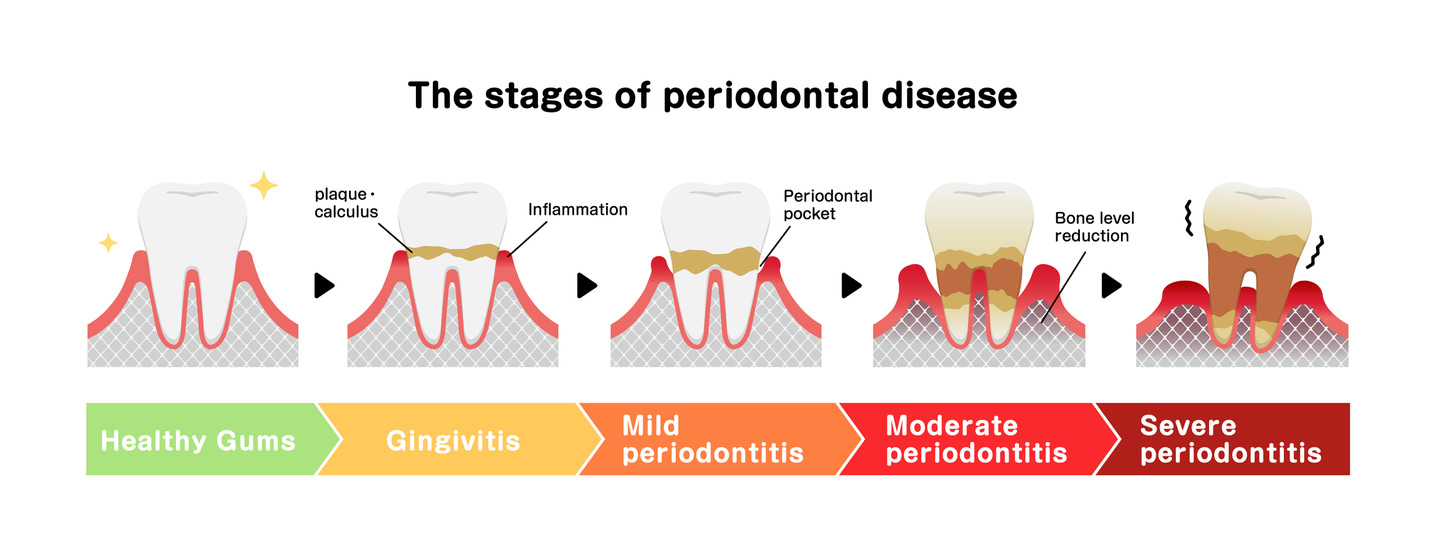PERIODONTAL TREATMENT
Periodontal Treatment is the treatment of periodontal disease, which is a condition affecting the gums, periodontal ligament and bone that hold in the teeth.
Periodontal disease, like tooth decay, starts with plaque, the furry off-white stuff that builds up on teeth and gums. Plaque mainly consists of bacteria. These are fed by sugar in the diet. These bacteria produce an acid that attacks the teeth, causing tooth decay, and the gums, causing gingivitis and periodontal disease. Gingivitis is an inflammation of the gums around the teeth. The gums will be red, may be a little swollen, and will bleed more easily, especially when brushing. It is important to remember that the bleeding is caused by inflammation, not by brushing. Brushing the gums in small circles with a soft brush or an electric brush along with restricting sugar in the diet to mealtimes, can reverse gingivitis. Flossing, especially thicker flosses like Oral-B Superfloss and Ultrafloss, as well as interdental brushes in larger spaces and mouthwashes, and water "flossers" (which inject water or mouthwash between the teeth) will also help.
If gingivitis is not controlled, it can lead to periodontal disease. The plaque that is not removed can calcify and form tartar. Tartar, also called calculus, is hard and can only be removed by a dentist, hygienist, or periodontist. The acid produced by the bacteria breaks down the attachment of the periodontal ligament to the teeth. The plaque and tartar begin to move below the gum line and onto the root of the tooth. When this happens, "pockets" or deeper areas can develop. The bone surrounding the teeth doesn't like all this inflammation, bacteria and tartar, and starts to recede. Pockets get deeper. Tooth sensitivity can increase as the root surface is exposed. This is now called periodontal disease, as it involves the periodontal tissues that connect the root to the bone. 
Periodontal Disease is treated by removing the debris (Plaque, tartar and proteins/fats/sugars that make it stick to the teeth) on the root surface below the gum line. At this early stage the condition can be stopped by this treatment and regular scaling by the dentist or hygienist and improved oral hygiene and sugar-control can prevent it from getting worse. Bone loss, however, can't be reversed. If the bone loss is not arrested, the teeth will start to get mobile. Once this happens, it becomes a case of managing the condition. Eventually the tooth may have to be extracted. It may, however, be years before an extraction is required.
We provide Scale and Polishing, which should be done every 6 months to control tartar. We charge €60, or €15 if you are covered by the PRSI. This can be done with hand instruments called scalers or an ultrasonic scaler, that removes the tartar using tiny ultrasonic vibrations, or a combination of both. This usually doesn't require anaesthetic. We also provide non-surgical Periodontal Treatment. This involves "root planing" or "deep scaling" the root surface in the pockets below the gum line, again using hand scalers, the ultrasonic scaler, and curettes (specially shaped hand instruments for root cleaning). The pockets are also irrigated and sometimes an antibacterial medication can be inserted in the pocket. A local anaesthetic is usually required. Periodontal pockets can get infected, causing periodontal abscesses that may require antibiotics. We usually treat a quarter of the mouth ("quadrant") at a time. Dr Kahn provides our Periodontal Treatment, in which he has a special interest. He charges €150 per quadrant.
Some conditions that can adversely affect the gums are diebetes and epilepsy. Smoking is particularly important because it causes irreversible bone loss while reducing the early warning signs of redness and bleeding.
When a tooth needs to be extracted, the options for replacing it are a denture (plastic or metal frame), bridge, or implant. As bridges are attached to the teeth either side of the space, those teeth need to be in good periodontal condition. If you have periodontal disease that requires extractions, it is likely that they are not, and an implant or denture may be the only treatment options.